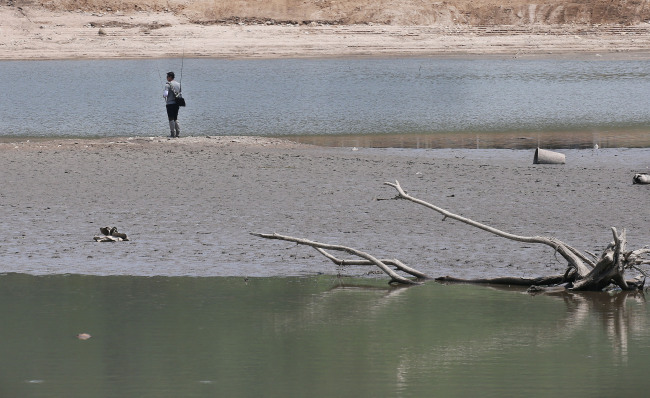Farmers and residents in northern parts of the country Tuesday repeated requests for help to survive an escalating drought here that has left riverbanks dry and crops withering.
Meteorologists predicted continued sunshine in the coming days, meaning that government efforts could ultimately fail to offset falling crop yields and rising vegetable prices, worsening consumer sentiment and escalating public fears of water deficits in areas far away from those hardest-hit.
Rainfall is expected in parts of the country Wednesday, but experts say it will fall far short of the required precipitation levels needed to fight the drought.
Precipitation in South Korea this year is 80 percent of annual averages according to the Korea Meteorological Association. Seoul and Gyeonggi and Gangwon provinces have been among the worst-hit regions, with about 51 percent of average annual rainfall.
Meteorologists predicted continued sunshine in the coming days, meaning that government efforts could ultimately fail to offset falling crop yields and rising vegetable prices, worsening consumer sentiment and escalating public fears of water deficits in areas far away from those hardest-hit.
Rainfall is expected in parts of the country Wednesday, but experts say it will fall far short of the required precipitation levels needed to fight the drought.
Precipitation in South Korea this year is 80 percent of annual averages according to the Korea Meteorological Association. Seoul and Gyeonggi and Gangwon provinces have been among the worst-hit regions, with about 51 percent of average annual rainfall.

The drought comes after summers filled with extreme cycles involving devastating droughts and deadly floods during Korea’s increasingly hot summers. A combination of climate change and mixtures of high and low levels of air pressure are the likely causes, experts have said.
But experts were puzzled as to the reasons for the extreme shifts in Korea’s recent summers. Some speculate that the recent droughts are part of a cycle that brings the worst droughts every 124 years, based on weather records dating back to the 12th century.
“If you look at the records dating back to (the 12th century), there are five (meteorological cycles),” Byon Hi-ryong, professor of atmospheric sciences at Pukyong University in Busan, said.
“This year is when two of those cycles meet. One is a 38-year cycle of dire droughts. The other is a 124-year cycle of extreme droughts,” he added.
Officials, however, have been slow to create fundamental solutions to the ongoing weather problems. Critics say the government has been busy writing impromptu emergency plans to combat the drought’s effects. The government lacks a long-term plan, critics added.
Minister of Agriculture, Food and Rural Affairs Lee Dong-phil vowed earlier Tuesday to muster 62.5 billion won ($56 million) to fight this year’s drought. The money will provide water to struggling farms. Over 16,000 soldiers, policemen, and officials will deliver the water, Lee said.
The proposal comes after criticism from the main political parties that the Park Geun-hye administration had done too little too late.
“The government has abandoned local governments to deal with the droughts themselves,” main opposition New Politics Alliance for Democracy chairman Rep. Moon Jae-in said Monday.
“The government must come up with an all-out plan to tackle this growing problem.”
Land Ministry and K-Water officials have also been compelled to contain water reserves of the Hangang River, the main water source for the Seoul metropolitan area, despite the drought. Officials fear that the lack of rainwater could eventually deplete water reserves for Seoul.
K-Water is a public company managing South Korea’s public water system.
Signs showing the drought’s overwhelming effects on South Korea continued to increase public fear that the water deficit was worse than expected.
Lettuce prices rose by 176 percent in the first half of June, the Korea Rural Economic Institute, a public think tank, said. Radish prices rose to 743 won per kilogram, higher than prices from last year that stood at about 500 won per kilogram.
Increasing algal blooms in the downstream waters of the Nakdonggang River have also raised public fears that the drought is far from over.
A struggling farmer surnamed Gweon expressed his frustration last Saturday.
“I can’t remember when the last real rain fell here,” he said. “Do you think I should just give up?”
By Jeong Hunny (hj257@heraldcorp.com)
-
Articles by Korea Herald


![[Exclusive] Korean military set to ban iPhones over 'security' concerns](http://res.heraldm.com/phpwas/restmb_idxmake.php?idx=644&simg=/content/image/2024/04/23/20240423050599_0.jpg&u=20240423183955)

![[Graphic News] 77% of young Koreans still financially dependent](http://res.heraldm.com/phpwas/restmb_idxmake.php?idx=644&simg=/content/image/2024/04/22/20240422050762_0.gif&u=)



![[Pressure points] Leggings in public: Fashion statement or social faux pas?](http://res.heraldm.com/phpwas/restmb_idxmake.php?idx=644&simg=/content/image/2024/04/23/20240423050669_0.jpg&u=)










